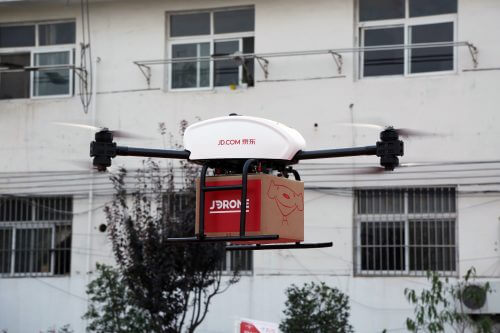A Chinese company has announced its intention to build two hundred launch and landing stations for drones, which will allow parcels and loads to be transported to the Chinese villages and agricultural goods collected from them

JD.com is one of the largest delivery companies in China. In recent years, the company has examined the possibility of using drones to bring goods to Chinese villages in well-restricted areas. Apparently the tests were passed successfully, since now JD has announced its intention to accept a committee to build within three years almost two hundred launch and landing stations for drones, which will make it possible to transport packages and loads to the Chinese villages, and collect agricultural goods from them.
Why? First of all, the company recognized that collecting the agricultural goods from the villages using drones would allow the harvest to be brought all over China within 24 hours, and would lower the prices of some goods by seventy percent.
But that's just the beginning.
Like any company, JD is also looking for buyers for its goods, and it understands that when the economic situation of the villagers improves, they will start ordering deliveries online like everyone else - and expect to receive them quickly. Using the drones, JD expects to bring deliveries quickly and efficiently even to the book areas that are far from the main cities, and even in the mountains and lakes.
It is worth noting this last point: the expectation is that the villagers will have money. We like to talk about robots taking jobs, but even in the most extreme situation (which we are unlikely to reach any time soon) where robots are able to do all the work for humans, there is still meaning to products and objects created by "handwork". Because let's face it for a moment: a plastic chair is as successful as any wooden chair, for almost any purpose, but when guests come home, we will still prefer to sit them on chairs carved from mahogany wood, delicately handcrafted. Why? Because we don't want to look stingy and cheap. That is, there will always be work for some of the people who will do artistic handicrafts - and the Chinese villagers are included in this category. Already today, more than ten percent of the parents' houses in the villages sell decorations, dolls, artistic bicycles, and much more through the Internet. And they make quite a bit of money for it, thanks for asking (1.6 million dollars per village on average, according to Business Insider).
So the future is coming soon, and it belongs to everyone equally: to the villagers who will be able to benefit from immediate deliveries, who will continue to increase their economic potential, and to the people of the city who will be able to receive goods and crops from the people of the village cheaply and immediately.
Now all that remains is to wait and see if JD will be able to fulfill its ambitious plans in three years. This seems to me to be a perfectly possible period of time, considering that the cost of establishing the launch and landing stations for the drones should not be high. But we will continue to watch and wait, until this good future arrives. And maybe in the end, also to us in Israel.
See more on the subject on the science website:
- Switzerland launches automated delivery service using drones
- State Comptroller: Israel is not adapting its defense to the rate of development of the threat from drones
- "One accident is enough to cause the drone market to collapse"
- Tiny vessels capable of operating in both air and water inspired by seabirds and marine animals
- Insect-inspired unmanned aerial vehicles
- Researchers help robots function under conditions of uncertainty
You are invited to read more about drones and how they are expected to integrate into society and change it in my new book "who control the future", in the selected bookstores (and those that are just fine).

One response
Another human messenger lost his job.